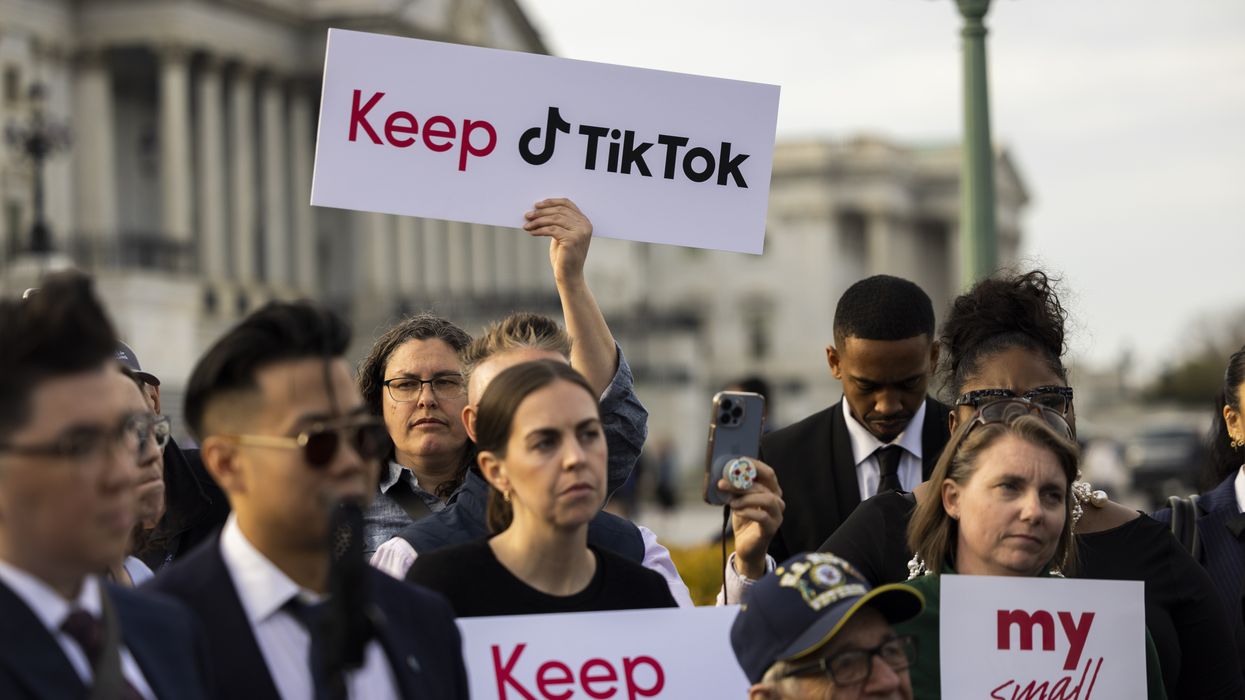Lawmakers, Civil Society Groups Urge Supreme Court to Block TikTok Ban
"Banning this social media platform would trample on the constitutional rights of over 170 million Americans."
Update (December 28):
On Friday evening, President-elect Donald Trump filed a brief with the Supreme Court that took no position on whether a ban on TikTok would violate First Amendment rights. Instead, he wrote that he has "consummate deal-making expertise," and as president would be able to "negotiate a resolution to save the platform while addressing the national security concerns expressed by the government."
Trump touted his understanding of social media, noting that he has 14.7 million followers on TikTok. He also said the timing of the impending ban—one day before he takes office–interferes with his "ability to manage the United States’ foreign policy and to pursue a resolution" that will preserve the app in the United States and protect national security.
Earlier:
Ahead of the U.S. Supreme Court's scheduled hearing on social media company TikTok's appeal regarding a ban on the popular platform, three bipartisan lawmakers were among the First Amendment advocates who filed amicus briefs in support of the app on Friday.
Sens. Ed Markey (D-Mass.) and Rand Paul (R-Ky.) were joined by Rep. Ro Khanna (D-Calif.) in asking the court to grant TikTok an emergency injunction to block the Protecting Americans from Foreign Adversary Controlled Applications Act from banning the app on January 19 unless the platform's Chinese parent company sells its stake by then.
The law and its ban on TikTok would "deprive millions of Americans of their First Amendment rights," said the lawmakers.
"The TikTok ban does not survive First Amendment scrutiny," Markey, Paul, and Khanna added. "Its principal justification—preventing covert content manipulation by the Chinese government—reflects a desire to control the content on the TikTok platform and in any event could be achieved through a less restrictive alternative."
The law was signed by President Joe Biden in April over the objections of First Amendment advocates, and a federal appeals court upheld the ban earlier this month. The Supreme Court then agreed to hear TikTok's challenge.
The ACLU, the Center for Democracy & Technology (CDT), and the Freedom of the Press Foundation were among several civil liberties groups that also filed a amicus brief on Friday, arguing that the government has not presented sufficient evidence that the app, which is used by 170 million Americans, causes "ongoing or imminent harm."
Patrick Toomey, deputy director of the ACLU's National Security Project, said the government's attempt to ban Americans from using TikTok, which some creators use to share commentary on geopolitical events as well as weighing in on pop culture and creating humorous videos, is "extraordinary and unprecedented."
"This social media platform has allowed people around the world to tell their own stories in key moments of social upheaval, war, and natural disaster while reaching immense global audiences," Toomey said.
TikTok, he said, is "a unique forum for expression online—and the connections and community that so many have built there cannot be easily replaced. TikTok creators can't simply transfer their audiences and followers to another app, and TikTok users can't simply reassemble the many voices they've discovered on the platform."
At CDT, Free Expression Project director Kate Ruane said the groups' amicus brief "makes clear that national security interests do not diminish protections afforded by the First Amendment and that courts must impose the same rigorous standards to laws that restrict speech."
"It further argues that the D.C. Circuit misapplied strict scrutiny when it failed to significantly examine the government's vague and nonspecific national security justifications for enacting the statute," said Ruane. "In light of the law's sweeping ban on free expression, the coalition's brief argues that the court should block implementation of the Protecting Americans from Foreign Adversary Controlled Applications Act."


